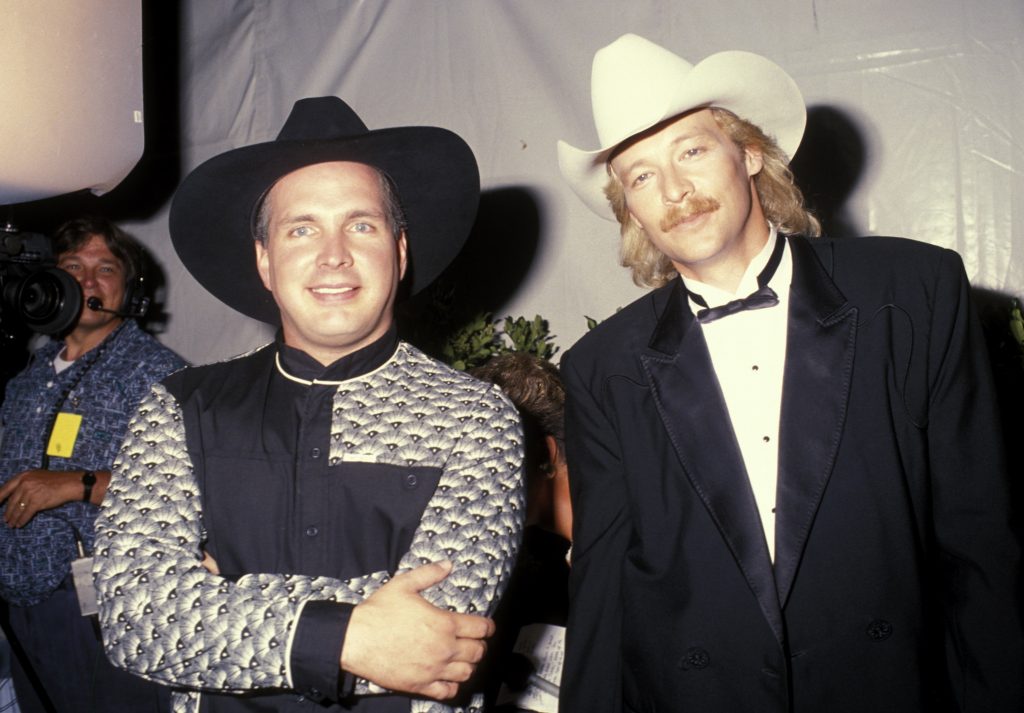Alan Jackson has been “keeping it country” for more than 30 years, and he shows no signs of letting up on that path. Signifying that you can’t pull the stops on a hard working country man, Jackson is back at it, releasing his first new studio album in six years on May 14th. And like the tall, lanky star himself, the album, titled Where Have You Gone, comes in a big package, loaded with 21 songs, 15 of those from his own pen.
To help mark the new album, Sounds Like Nashville is taking a retrospective rewind of the highlights of Jackson’s storied career, in which he literally went from the mailroom to the upper echelon of country stardom. Bearing a rich, honey-smooth vocal style drawn from the Southern country traditions, Jackson has become one of the most awarded acts in country history. He has scored 26 Billboard No. 1 singles and won a plethora of industry accolades, including 16 CMA Awards, with three of those coming for Entertainer of the Year, two Grammy awards, and 17 ACM Awards. In 2017, he was inducted into the Country Music Hall of Fame.

“THE CLASS OF ’89”
Success didn’t exactly come rapidly for Jackson, though. In fact, his country music journey started relatively late, compared to most aspiring newbies who make the trek to Nashville seeking those elusive dreams of fame and unbelievable fortunes. Jackson grew up in Newnan, Georgia, not far from Atlanta, and lived the typical small town life with his working class family, even marrying his high school sweetheart, Denise. After graduating from high school, he joined a local band called Dixie Steel. He was introduced to the music of country giants like Gene Watson and Hank Williams Jr., and he also wrote songs, but apparently never expressed any burning desire to move to Nashville to pursue singing and writing.
That didn’t happen until Alan reached age 27, which would be considered practically middle aged by today’s standards. After moving to Nashville, Alan wrote songs but needed a way to pay the bills, so he took an afternoon gig in the mailroom at The Nashville Network, the cable channel devoted to country music programming. Denise worked as an airline flight attendant and happened to meet Glen Campbell on one particular stop in Nashville. What followed is a dreamlike scenario, fleshed out like a Hollywood script except that this was no fairy tale. It was pure reality.
Denise asked for some advice for her husband and Campbell gave her the business card of his manager and told her to call. Jackson went to have a meeting with Campbell’s manager, who ended up giving Alan a job writing songs for Campbell’s publishing company. As it turned out, Denise’s chance encounter helped kickstart Alan’s amazing career.
In an Instagram post following Campbell’s death in 2017, Jackson wrote, “I will always feel like I owe Glen a lot of gratitude. He was my first contact in Nashville when my wife, Denise, was a flight attendant. She met him at the airport and he gave her his business card for his publishing company. This connection [led] me down the path that brought me to where I am today.”
Now entrenched in Music City, Jackson paid the usual beginners’ dues, playing showcases for record labels and coming away with not even a smattering of interest. He once remembered that some labels turned him down more than once, with one exec even suggesting that he hightail it back to Georgia. Eventually, Jackson was signed to Arista Nashville Records. He became a member of a group of young artists who were collectively known as the “Class of ’89,” a distinguished class of performers who all debuted in the same year. These artists had a vibrant, new sound that paid tribute to tradition, but also were influenced by genres like contemporary Southern rock, folk, and R&B. His fellow classmates, as it were, included Garth Brooks, Clint Black, Travis Tritt, and Mary Chapin Carpenter, all of whom released their debut singles in 1989. They captured a younger demographic and, in turn, introduced a legion of new fans to country music.
Jackson actually took the longest time of any of the ’89 class to reach the chart stratosphere. While the others reaped No. 1 records early on, with Black actually topping the charts with his first four singles, Jackson had to wait a couple of years. He finally scored his first No. 1 in 1991 with a song he’d written for Denise, “I’d Love You All Over Again.” It was his fifth career single, penned, as he once recalled, in a motel room in Pine Bluff, Arkansas, on a rainy night. From that point, Jackson’s fortunes began to soar with the speed of a jet aircraft. Five of his next six singles, including “Don’t Rock the Jukebox” and “Someday,” all hit the top.
Then in 1992, Jackson’s third career album, A Lot About Livin’ (And a Little ‘Bout Love), established him as a major country star. The record produced the No. 1 singles “She’s Got the Rhythm (And I Got the Blues)” and “Chattahoochee,” an autobiographical tune about the river where Jackson played as a kid but also a Mark Twain-ish tale of coming of age in a small town. “I didn’t think anybody would connect with it,” Jackson recently told Apple Music. “But then I realized that everybody’s got some kind of Chattahoochee somewhere, and still, to this day, it’s that way.” The playful tune won CMA awards for both Single and Song of the Year and helped spark Jackson to his first No. 1 album, which stayed at the top for five weeks in 1993.
Jackson’s fourth album Who I Am yielded four No. 1 singles, featuring a remake of the Eddie Cochran rockabilly standard “Summertime Blues” and the slyly humorous “Gone Country,” a witty commentary on singers from other genres who try making it in country as a last resort. Who I Am also hit No. 1 on the charts. On the strength of this and the previous No. 1 album, Jackson copped his first CMA Entertainer of the Year award in 1995.
Jackson closed out the 90s by returning to his past, releasing an album of country standards called Under the Influence. The entire collection was comprised of cover versions of the classic country songs that inspired Jackson, like Gene Watson’s “Farewell Party” and the Don Williams favorite, “It Must Be Love.” He revealed to Country Weekly in 1999, “I could do a whole album of Don Williams songs. I sang ‘It Must Be Love’ a lot back in the early 80s, before I had a record deal and was just playing little clubs and bars.” Williams took the song to No. 1 in 1979 and more than 20 years later, Jackson did the same with his version, which reached the top in September of 2000. It was one of the rare instances where both the original and the remake hit No. 1. Jackson proved that he was equally at home with the classics as he was with his own material.
WHEN THE WORLD STOPPED TURNING
The new century began with one of the most earth-shattering events in American history, the fatal terrorist attacks on the United States on September 11, 2001. As a tribute to those who lost their lives, Jackson responded with a poignant song that he wrote himself, “Where Were You (When the World Stopped Turning).” Jackson debuted the song on the 2001 CMA Awards telecast and it was universally praised as the highlight of the broadcast. The live performance of the song began receiving radio airplay and was soon released as a single. A live and a radio version were both featured on Jackson’s 2002 album Drive, which copped the CMA award for Album of the Year.
Jackson remembered that he started “Where Were You” in the middle of the night. “I just woke up and this whole chorus was there and it pretty much ended up exactly the way it came in the middle of that night,” Jackson told Apple Music. “And I just felt like it needed to be written down. I went downstairs and I recorded that chorus and then the next morning, I just sat down and wrote all those little verses that were basically just visual memories I’d had of all this stuff going on.” Jackson expressed a little hesitation to Denise about the song, not wishing to take advantage of a tragic situation. But she convinced her husband that fans would embrace the sentiment and would want to hear the heartfelt message.
“Where Were You (When the World Stopped Turning)” was released as a single in November of 2001 and raced to No. 1 by the end of December. The powerful anthem won both the CMA Single and Song of the Year in 2002 and propelled Jackson to his second CMA Entertainer of the Year award, an honor he repeated in 2003. Jackson also won the CMA Male Vocalist of the Year awards in 2002 and 2003.
Jackson’s hits continued through the mid-2000s with No. 1 singles “Drive (For Daddy Gene),” written in honor of his dad, and his multi-week chart-topper in 2003, “It’s Five O’Clock Somewhere,” a duet with rock titan Jimmy Buffett. The touching “Remember When” also reached No. 1 in 2004.
Jackson, of course, constructed his fan base by “Keeping it country,” even in an era when more pop-dominated sounds began to rule the airwaves. Only once did he shift course from traditional country, with his 2006 album, Like Red on a Rose. Originally intended as a bluegrass album, the record, produced by Alison Krauss, veered closer to a soft rock sound and emphasized introspective-type songs. This caused a bit of controversy with his fan base, who accused him of abandoning his traditional country style. Like Red on a Rose earned critical acclaim and debuted at No. 1, but did not sell particularly well. The album also did not produce a No. 1 single. It was likely the only wrong turn in Jackson’s otherwise flawless career.
But for his next album, Good Time, Alan was ready to get back to basics. Released in 2008, Good Time lived up to its title, providing a serious departure from the previous record, “I thought it was time to do an album that was fun country music like I’ve always made,” Jackson explained to Country Weekly in 2008. The title tune served as a perfect example, an up-tempo track about a working man who can’t wait for the work day to end and looks forward to Fridays when he can let loose and forget about the rigors of his job. It’s time for a good time, he declares in the song’s key passage. The lyrics also referenced Hank Williams Jr.’s “All My Rowdy Friends Are Coming Over Tonight” and “Boot Scootin’ Boogie” by Brooks & Dunn. The rollicking number put Jackson back on top again, hitting No. 1 in April of 2008, becoming the 24th chart-topper of his career. The first single from the album, “Small Town Southern Man,” also peaked at No. 1. Good Time also became his tenth No. 1 studio album.
In 2014, the Country Music Hall of Fame and Museum in Nashville opened a special exhibit to commemorate Jackson’s 25 years in the music business. The celebration continued with Jackson’s massive tour beginning in 2015, appropriately titled the 25th Anniversary Keepin’ It Country Tour, that ran from January through the end of summer.

THE NEW ALBUM
As radio continues to focus on a younger market, featuring artists who pepper their music with rap and hip-hop styles, Jackson has become one of the victims of that generational shift. His songs fail to receive airplay these days, and he’s basically only heard on stations that occasionally play classics mixed in with the more contemporary singles. But that hasn’t stopped Jackson from recording and making new music.
He’s pumped about his latest effort Where Have You Gone. Jackson told Apple Music, “My songs won’t probably play on radio and I’m not bitter about it at all. It just takes [the] pressure off. You don’t have to worry about, ‘Do I need to try to record something for radio? Trying to get on radio or singles?’ I don’t care if it’s on the radio. I started just wanting to make music I love and I know most of my fans love.”

